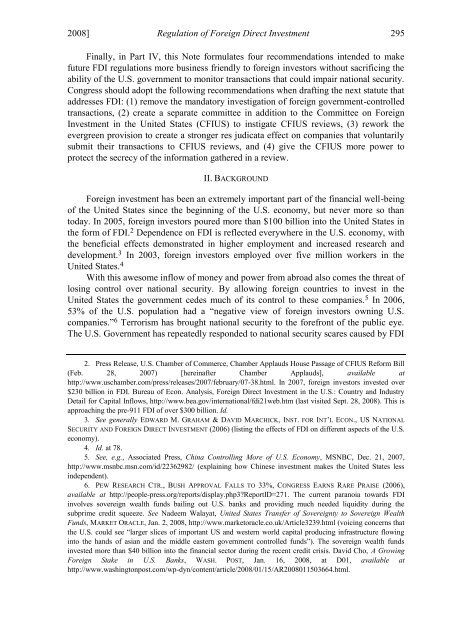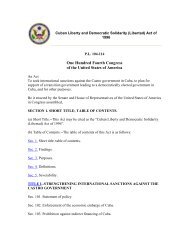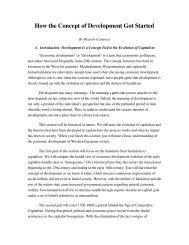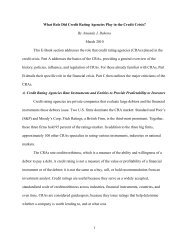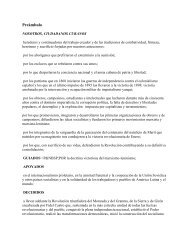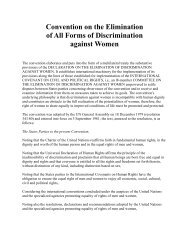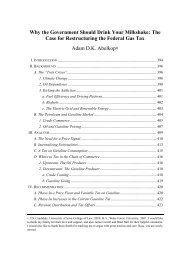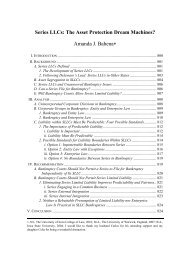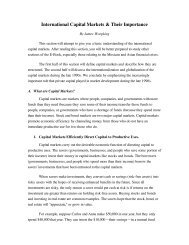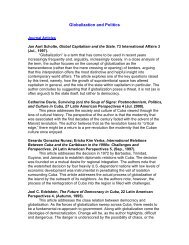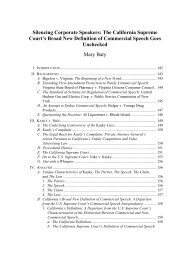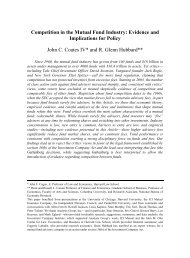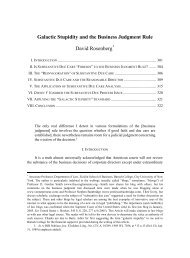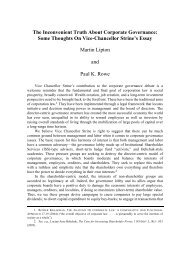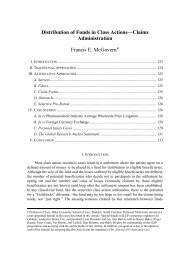Regulation of Foreign Direct Investment After the Dubai Ports ...
Regulation of Foreign Direct Investment After the Dubai Ports ...
Regulation of Foreign Direct Investment After the Dubai Ports ...
Create successful ePaper yourself
Turn your PDF publications into a flip-book with our unique Google optimized e-Paper software.
2008] <strong>Regulation</strong> <strong>of</strong> <strong>Foreign</strong> <strong>Direct</strong> <strong>Investment</strong> 295<br />
Finally, in Part IV, this Note formulates four recommendations intended to make<br />
future FDI regulations more business friendly to foreign investors without sacrificing <strong>the</strong><br />
ability <strong>of</strong> <strong>the</strong> U.S. government to monitor transactions that could impair national security.<br />
Congress should adopt <strong>the</strong> following recommendations when drafting <strong>the</strong> next statute that<br />
addresses FDI: (1) remove <strong>the</strong> mandatory investigation <strong>of</strong> foreign government-controlled<br />
transactions, (2) create a separate committee in addition to <strong>the</strong> Committee on <strong>Foreign</strong><br />
<strong>Investment</strong> in <strong>the</strong> United States (CFIUS) to instigate CFIUS reviews, (3) rework <strong>the</strong><br />
evergreen provision to create a stronger res judicata effect on companies that voluntarily<br />
submit <strong>the</strong>ir transactions to CFIUS reviews, and (4) give <strong>the</strong> CFIUS more power to<br />
protect <strong>the</strong> secrecy <strong>of</strong> <strong>the</strong> information ga<strong>the</strong>red in a review.<br />
II. BACKGROUND<br />
<strong>Foreign</strong> investment has been an extremely important part <strong>of</strong> <strong>the</strong> financial well-being<br />
<strong>of</strong> <strong>the</strong> United States since <strong>the</strong> beginning <strong>of</strong> <strong>the</strong> U.S. economy, but never more so than<br />
today. In 2005, foreign investors poured more than $100 billion into <strong>the</strong> United States in<br />
<strong>the</strong> form <strong>of</strong> FDI. 2 Dependence on FDI is reflected everywhere in <strong>the</strong> U.S. economy, with<br />
<strong>the</strong> beneficial effects demonstrated in higher employment and increased research and<br />
development. 3 In 2003, foreign investors employed over five million workers in <strong>the</strong><br />
United States. 4<br />
With this awesome inflow <strong>of</strong> money and power from abroad also comes <strong>the</strong> threat <strong>of</strong><br />
losing control over national security. By allowing foreign countries to invest in <strong>the</strong><br />
United States <strong>the</strong> government cedes much <strong>of</strong> its control to <strong>the</strong>se companies. 5 In 2006,<br />
53% <strong>of</strong> <strong>the</strong> U.S. population had a ―negative view <strong>of</strong> foreign investors owning U.S.<br />
companies.‖ 6 Terrorism has brought national security to <strong>the</strong> forefront <strong>of</strong> <strong>the</strong> public eye.<br />
The U.S. Government has repeatedly responded to national security scares caused by FDI<br />
2. Press Release, U.S. Chamber <strong>of</strong> Commerce, Chamber Applauds House Passage <strong>of</strong> CFIUS Reform Bill<br />
(Feb. 28, 2007) [hereinafter Chamber Applauds], available at<br />
http://www.uschamber.com/press/releases/2007/february/07-38.html. In 2007, foreign investors invested over<br />
$230 billion in FDI. Bureau <strong>of</strong> Econ. Analysis, <strong>Foreign</strong> <strong>Direct</strong> <strong>Investment</strong> in <strong>the</strong> U.S.: Country and Industry<br />
Detail for Capital Inflows, http://www.bea.gov/international/fdi21web.htm (last visited Sept. 28, 2008). This is<br />
approaching <strong>the</strong> pre-911 FDI <strong>of</strong> over $300 billion. Id.<br />
3. See generally EDWARD M. GRAHAM & DAVID MARCHICK, INST. FOR INT‘L ECON., US NATIONAL<br />
SECURITY AND FOREIGN DIRECT INVESTMENT (2006) (listing <strong>the</strong> effects <strong>of</strong> FDI on different aspects <strong>of</strong> <strong>the</strong> U.S.<br />
economy).<br />
4. Id. at 78.<br />
5. See, e.g., Associated Press, China Controlling More <strong>of</strong> U.S. Economy, MSNBC, Dec. 21, 2007,<br />
http://www.msnbc.msn.com/id/22362982/ (explaining how Chinese investment makes <strong>the</strong> United States less<br />
independent).<br />
6. PEW RESEARCH CTR., BUSH APPROVAL FALLS TO 33%, CONGRESS EARNS RARE PRAISE (2006),<br />
available at http://people-press.org/reports/display.php3?ReportID=271. The current paranoia towards FDI<br />
involves sovereign wealth funds bailing out U.S. banks and providing much needed liquidity during <strong>the</strong><br />
subprime credit squeeze. See Nadeem Walayat, United States Transfer <strong>of</strong> Sovereignty to Sovereign Wealth<br />
Funds, MARKET ORACLE, Jan. 2, 2008, http://www.marketoracle.co.uk/Article3239.html (voicing concerns that<br />
<strong>the</strong> U.S. could see ―larger slices <strong>of</strong> important US and western world capital producing infrastructure flowing<br />
into <strong>the</strong> hands <strong>of</strong> asian and <strong>the</strong> middle eastern government controlled funds‖). The sovereign wealth funds<br />
invested more than $40 billion into <strong>the</strong> financial sector during <strong>the</strong> recent credit crisis. David Cho, A Growing<br />
<strong>Foreign</strong> Stake in U.S. Banks, WASH. POST, Jan. 16, 2008, at D01, available at<br />
http://www.washingtonpost.com/wp-dyn/content/article/2008/01/15/AR2008011503664.html.


